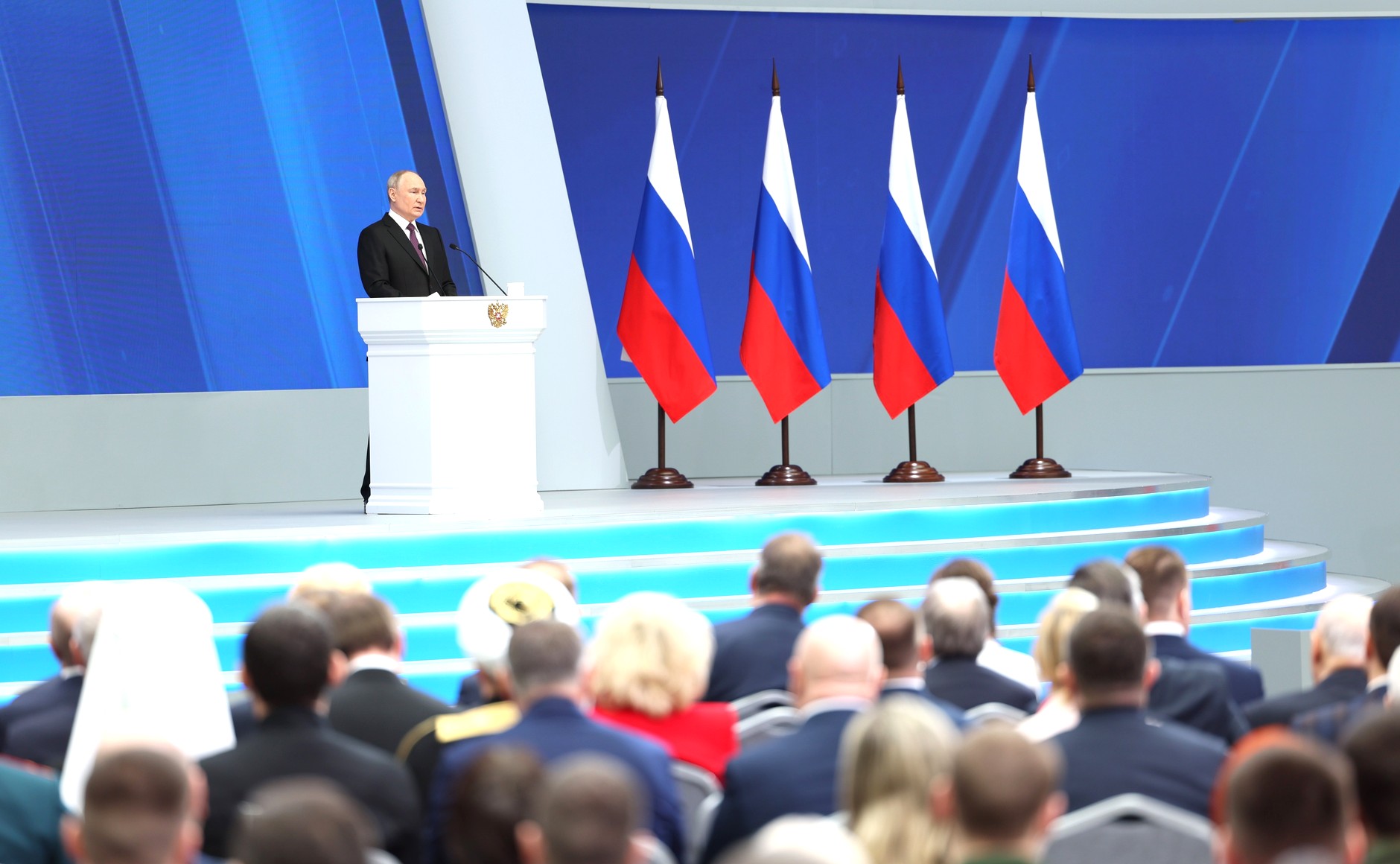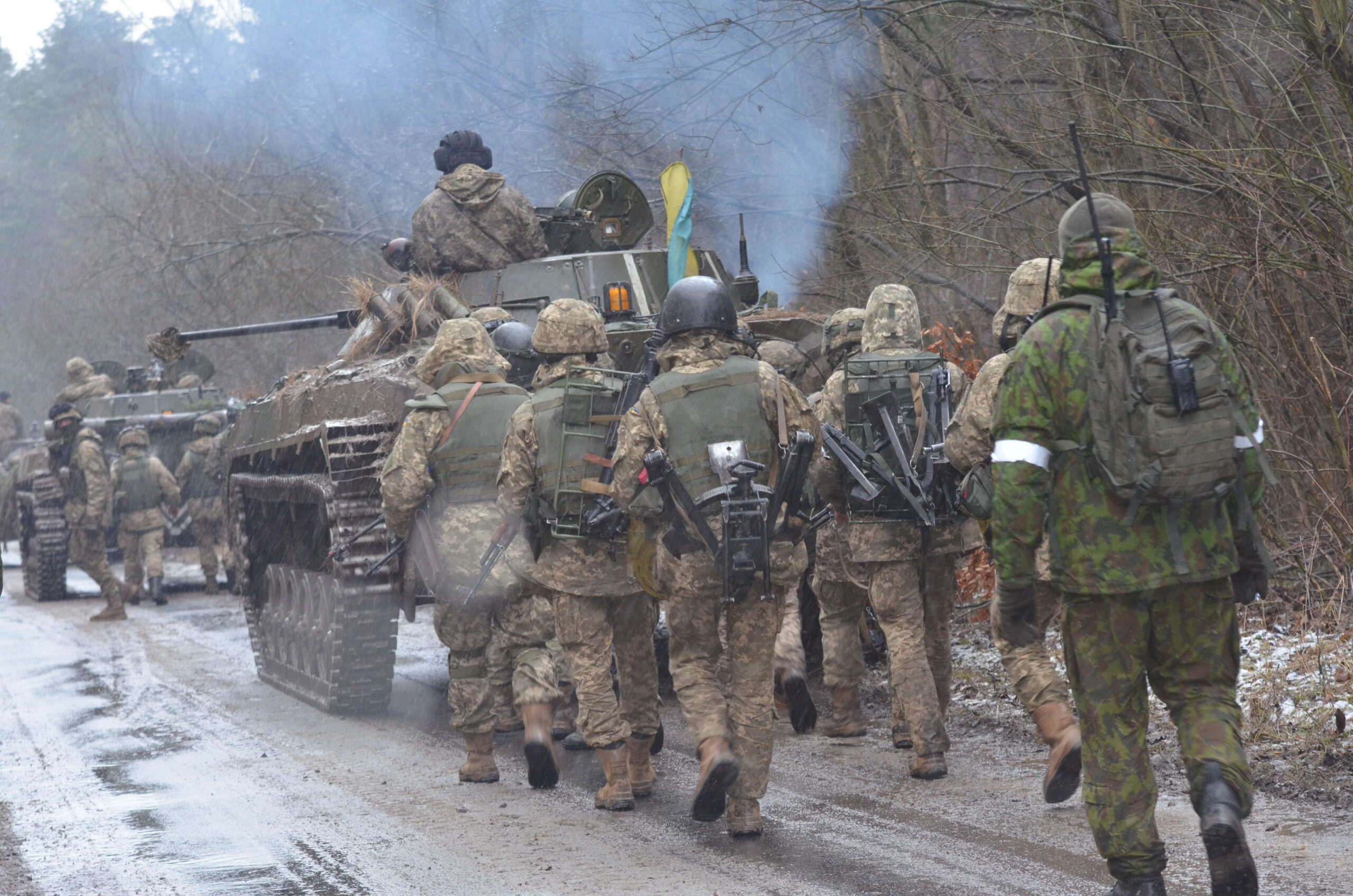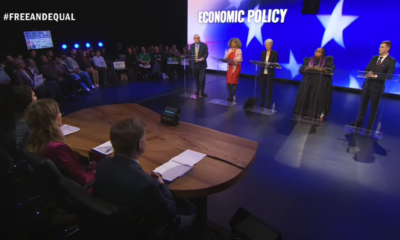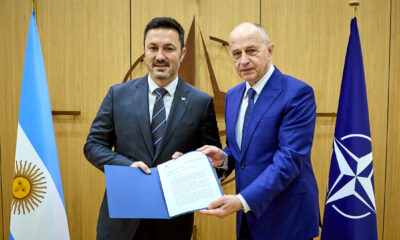Defense
Putin warns of nuclear war risk if NATO deploys to Ukraine

During the annual state of the nation address in Russia on Thursday, Russian President Vladimir Putin issued a warning for the West. Sparked by rumors of greater NATO involvement in Ukraine, Putin said that the West would be at risk of nuclear war if they deployed troops on the ground.
The speech laid out Putin’s plan for the future of Russia. He faces no major competition in the upcoming election, which will take place in March. This speech gave him a platform to lay out his vision for the nation. As of now, it looks likely that Putin will win another six year term. So while this was not an important speech for his campaign, it is relevant on the global stage.
Putin warned that Russia also had weapons that “can hit targets on their [Western] territory.” He said that he believes nuclear war is a real risk, and that he believes a nuclear conflict could mean the “destruction of our civilization.”
While he did not explicitly mention any specific comments that would allude to increased NATO support, it is likely that he was referring to the President of France, Emmanuel Macron. Earlier this week, Macron mentioned the possibility that NATO could deploy troops to Ukraine.
President Putin also elaborated on his intentions to not fall into another Cold War. He felt that the Cold War depleted the Soviet Union, and he would not fall into the same trap. Instead he expressed a desire to “develop a military industrial complex in a way that increases the scientific, technological, and industrial potential of the country.” This becomes part of his broader goal to modernize Russia and bring it on par with the West in terms of science and technology.
Putin also focused on a broader set of worker-focused policies. He listed plans to increase the birthrate, increase wages, increase agricultural and industrial outputs, spend more money on children, and overall improve Russian lives. He also introduced a plan to pay for some college for Russian veterans.
Defense
The growing rift between Biden and Netanyahu

A clear divide has appeared between US President Joe Biden and Israeli President Benjamin Netanyahu. What on October 7th appeared to be a relatively amicable relationship has since soured, as the United States has decreased aid to the nation amid human rights concerns.
Netanyahu has opposed the ceasefire plan proposed by President Biden, and his government has even accused the President of wanting to end the war without defeating Hamas for his own political gain.
This rift is starting to show in the Biden campaign’s preparations for Netanyahu’s upcoming speech to congress. Addressing a joint session, the Biden team will have no oversight over what Netanyahu will say. This could let him use the time as a means to attack President Biden over a lack of support.
This may not be just worries, there is already evidence to back up the fact that Netanyahu is willing to attack President Biden if necessary. He has already released videos, including some in English, that attack Biden for withholding military aid.
Biden has reportedly not yet invited Netanyahu to speak with him while he is in Washington, a move which will likely only serve to exacerbate tensions.
Biden is struggling to balance support for both Israel and Palestine in his bid for re-election, as he attempts to please both the progressive and the pro-Israel members of his party.
Defense
America’s “Red Line” shifts in Israel, Ukraine

The United States is currently involved in two major wars, one in Ukraine and one in Israel. In the past, it has seemed like we had laid out “red lines” that these countries could not cross when using United States equipment and receiving military aid. However those lines appear to be shifting yet again, deepening the intensity of both conflicts.
In Israel, the IDF has moved into Rafah. While the United States and many other allies of Israel around the world warned against this action, they now appear to have accepted it regardless of their previous statements.
In an interview with CNN earlier this month, Biden said “I made it clear that if they go into Rafah — they haven’t gone in Rafah yet — if they go into Rafah, I’m not supplying the weapons that have been used historically to deal with Rafah, to deal with the cities — that deal with that problem.”
However the White House today clarified that Israel has not crossed their “red line,” and affirmed America’s support for Israel. National Security Council spokesman John Kirby expressed concern about Israel’s actions, but he clarified that this would not result in a shift in military policy.
The United States is also allowing Ukraine a longer leash to utilize its military capabilities. Secretary of State Antony Blinken told European leaders that the United States may consider allowing Ukraine to strike inside Russian territory using American military equipment.
Previously, the United States has been careful to sanction anything that could be seen as a direct attack on Russian territory using US-made armaments. These changes come as Blinken signals that the United States feels the need to “adapt and adjust” their policies to the current situation in Ukraine.
President Biden has been hesitant to approve more aggressive action by Israel and Ukraine, with some observers citing his presidential campaign as a reason why he is being more cautious. Both wars have declined in popularity, and Israel’s actions have been especially controversial amongst Democratic supporters.
Defense
House passes $95 billion aid package for Ukraine and Israel

Following months of deadlock in the United States House of Representatives, a vote today approved roughly $95 billion in aid to Ukraine, Israel, Taiwan, and other United States allies. The deal was passed with bipartisan approval of both Democrats and Republicans, following opposition to similar deals from both the far-left and far-right.
The majority of the aid, an estimated $61 billion, will be sent to Ukraine. Ukraine has expressed the need for further financial support from the United States in order to keep fighting Russia. They have recently expressed concerns that if this aid package were to fail, they would struggle to hold the line.
Ukrainian President Volodymyr Zelenskyy expressed his gratitude for the aid on social media paltform X late on Saturday night. He specifically thanked Speaker Mike Johnson, who may have put his job on the line to get the bill across the finish line. There were renewed cries for his ousting from the far-right after the passage of the bill.
The bill also includes $26.4 billion for Israel to resupply their military as they fight against Hamas, and $8.1 billion to counter Chinese influence in the Indo-Pacific region. Much of that will go to support Taiwan.
Netanyahu also thanked America for its support, saying on X (formerly known as Twitter,) “Thank you friends, thank you America!”
The bill still has to pass the Senate, however that is unlikely to be an obstacle. Majority Leader Chuck Schumer has already made it clear that he supports the bill, and could bring it up for a vote as soon as Tuesday morning. President Biden has also expressed his support for the aid package, and said that he would sign it as soon as it passed the Senate.
-

 Campaign 20242 years ago
Campaign 20242 years agoNew poll reveals Hogan’s path to victory
-

 Campaign 20242 years ago
Campaign 20242 years agoRep. Mike Collins makes antisemitic post on X
-

 Campaign 20242 years ago
Campaign 20242 years agoThe Minor Candidate Debate Recap
-

 Opinion2 years ago
Opinion2 years agoOp-ed: Stop talking about Bidenomics
-

 Education2 years ago
Education2 years agoK-12 teachers report varied views on race, gender identity in new poll
-

 State Politics2 years ago
State Politics2 years agoThe new minimum wage in California
-

 Campaign 20242 years ago
Campaign 20242 years agoRFK Jr. campaign releases surprise rap song
-

 Campaign 20242 years ago
Campaign 20242 years agoRuben Gallego quietly leaves Progressive Caucus













